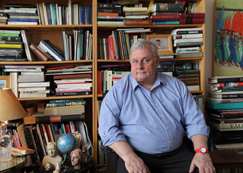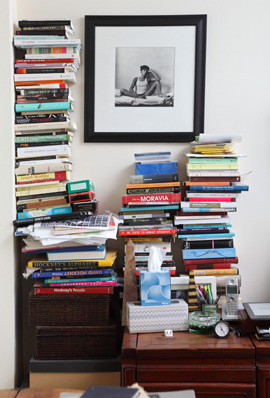

An Interview with Edmund White
LEAH PRICE: You’ve said, “As a young teenager I looked desperately for things to read that might excuse me or assure me I wasn’t the only one, that might confirm an identity I was unhappily piecing together.” What role did books play for you before and after that?
EDMUND WHITE: I stopped reading right after college—I had had it! But then soon enough, maybe two years later, I was reading again, this time strictly for pleasure. In those days we were so poor we only bought paperbacks, though once in a while we’d borrow hardcovers from the library. I never cared about first editions or even the material condition or look of a book, and I don’t think I kept books very long. I don’t have any books that I acquired in my twenties, though several times I’ve bought some titles (Kafka, Shakespeare, Beckett, Gide) that I owned in my twenties. When twelve years ago I moved back from France, after living there for sixteen years, I had a party where the numerous guests were invited to take any and all of the books—that way I got rid of most of them.
The bookshelf, literally: what are your shelves made of?
They’re wood—I think I bought them at a cheap ready made furniture store.
How do you arrange, or attempt to arrange, your books?
I don’t have that many books and they’re not arranged in any particular order. I think for a while I had the Genet and Proust books together, and they attracted other unrelated titles in French. My own books, which I keep in order to give away to friends, are in one section more or less. Big art books, which lie on their sides, are in yet another section. When I gave away a thousand books recently to Housing Works, I eliminated the books I thought I’d never read again or that I’d received from press services but had been too lazy to get rid of.
What books do you keep next to your bed?
Michael, my partner, has a very intimidating batch of books in his bathroom, but in mine there are just circulating books or magazines. The books beside the bed, les livres de chevet, are supposed to be important to the person who sleeps there, but mine aren’t.
As a critic and novelist, do you find yourself reading (or annotating) different genres differently?
I would annotate any book except a costly first edition or an illustrated book that is rare. I read so much for essays I’m writing (on Ford Madox Ford, say, or Henry James or Glenway Wescott—dozens and dozens of essays, usually for the New York Review and usually about writers). And for these essays I consult dozens of books and annotate them; if they’re from the Princeton library, I mark them with sticky notes, which I strip away and then return. Sometimes I’ll go to the Strand and buy every book about Henry James’s letters, for instance, that I can find, but I ship them out as soon as I’m finished with the essay.
You could say I’m pretty hostile to books as objects and space-grabbers and dust-collectors. When I was younger I loved having books sitting around in cartons—paperbacks with coffee stains on the covers—and I’d read a chapter here and a chapter there. But now partly because I’m so aware of my age (seventy-one), I see books as a problem I might end up imposing on my heirs.

My own manuscripts I sell to the Beinecke, and in the past I used to give them books that had helped me in my own work, but I have the feeling the librarians don’t really want those research books anymore.
Do you listen to audiobooks? Do you prefer reading aloud or being read aloud to?
I’ve never listened to an audiobook (I don’t own a car). I used to like reading my own work aloud to my long-suffering friends, and I still plague my poor partner, Michael Carroll, with my own prose.
How do you dispose of the books you don’t want—donating, recycling, putting out on the curb? Do you have any taboo against throwing away books when you’re done reading them, or replacing books when they fall apart from wear and tear?
I have no taboos about getting rid of books. I try to be a good citizen and give them to Housing Works, but if I truly despise a book, I’ll put it in the garbage. I don’t have tapes or LPs anymore, but I do keep hundreds of CDs, though I’m trying to weed them, too.
Do you lend books to friends?
I’m always giving books I’ve read to friends if I think they’d like them. There are so many new titles and so few reliable ways to know which are the good ones that I suppose friendship networks—composed of friends you respect and trust—are the best way to locate a good book.
What do you imagine your library looking like five, ten, twenty years from now? Do you think you’ll still own objects made of paper and glue? And—with apologies for a morbid question—do you ever think about what will happen to your library after your death?
Yes, I imagine that there will still be paper books and that I’ll still be reading them (of course I still write fiction by hand). I’m sure that after my death my books will be scattered just like my clothes and furniture.
Leo Tolstoy Anna Karenina
Penelope Fitzgerald The Blue Flower
Anton Chekhov The Collected Stories
Alan Hollinghurst The Folding Star
Vladimir Nabokov Lolita
Henry Green Nothing
Jean Genet Our Lady of the Flowers
Marcel Proust Remembrance of Things Past
Christopher Isherwood A Single Man
Murasaki Shikibu The Tale of Genji